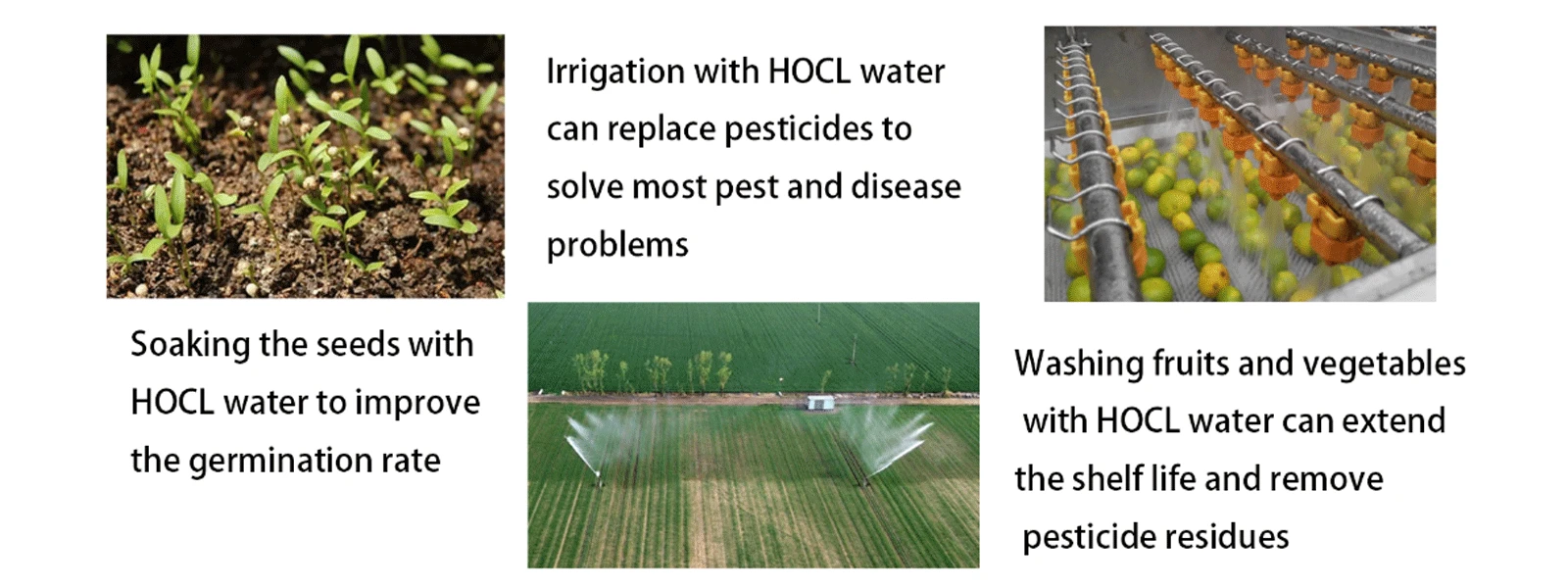1. Introduction to Hypochlorous Acid Generators
Hypochlorous acid generators are devices that produce hypochlorous acid. In the context of planting fields, these generators hold significant importance. Hypochlorous acid, also known as HClO, is a weak acid with strong oxidizing properties. It can be used as a disinfectant, bleaching agent, and oxidizer. In the field of planting, hypochlorous acid generators can help in several ways.
For one, they can be used to disinfect soil and water. This is important as it helps to eliminate harmful bacteria and fungi that can damage crops. By using hypochlorous acid generators, farmers can ensure that their soil and water are free from contaminants, which can lead to healthier plants and higher yields.
Moreover, hypochlorous acid can also be used to treat plant diseases. It has been show to be effective against a wide range of plant pathogens, including bacteria, fungi, and viruses. By using hypochlorous acid generators, farmers can treat plant diseases quickly and effectively, without the need for harmful chemicals.
In addition, hypochlorous acid generators are environmentally friendly. Unlike traditional pesticides and fertilizers, hypochlorous acid is non-toxic and does not leave harmful residues in the environment. This makes it a safe and sustainable option for farmers who are looking to reduce their environmental impact.
Overall, hypochlorous acid generators are a valuable tool for farmers in the planting field. They offer a safe, effective, and environmentally friendly way to disinfect soil and water, treat plant diseases, and improve crop yields.
2. Understanding Hypochlorous Acid
Definition and Properties
Hypochlorous acid (HClO) is an unstable weak acid. It is usually found in the form of an aqueous solution. Hypochlorous acid is also a disinfectant and can be use for the disinfection of objects, fabrics, water, fruits and vegetables, and tableware. In addition, it can be use for indoor air disinfection and the disinfection of hands, skin, and mucous membranes.
3. Application in Planting Fields
(1) Benefits for Plants
Hypochlorous acid generators offer several benefits for plants. Firstly, as a disinfectant, it helps in eliminating harmful pathogens such as bacteria, fungi, and viruses. This reduces the risk of plant diseases and promotes healthier growth. For example, studies have shown that the use of hypochlorous acid can significantly reduce the incidence of common plant diseases like powdery mildew and blight.
Moreover, hypochlorous acid can also provide certain nutrients to plants. Although it is a weak acid, it contains small amounts of chlorine and oxygen, which can be beneficial for plant growth. Chlorine, for instance, is an essential element for some plants and can help in photosynthesis. Oxygen, on the other hand, can improve root respiration and overall plant metabolism.
(2) Usage Methods
In agriculture, hypochlorous acid generators are used in various ways. When it comes to proper application techniques, it is important to follow the manufacturer’s instructions carefully. Generally, the generated hypochlorous acid can be spray directly on the plants, soil, or water. For spraying on plants, it is advisable to use a fine mist sprayer to ensure even coverage.
Regarding dosages, it depends on several factors such as the type of plants, the severity of the problem, and the size of the area. As a general rule, a concentration of around 50-100 ppm (parts per million) of hypochlorous acid is often use for plant disinfection. However, it is always best to start with a lower concentration and gradually increase if needed. It is also important to monitor the plants closely after application to ensure there are no adverse effects.
In addition, hypochlorous acid can be add to irrigation water. This not only disinfects the water but also provides benefits to the plants as the water is absorb by the roots. The amount of hypochlorous acid add to the irrigation water should be carefully measure to avoid over-dosage.
4. Conclusion
Hypochlorous acid generators play a crucial role in planting fields. They offer multiple benefits that contribute to healthier plants and higher yields.
First and foremost, as a disinfectant, they eliminate harmful bacteria, fungi, and viruses from soil and water. This helps prevent plant diseases and reduces the need for harmful chemicals. For instance, the firm has identified many potential customers at home and abroad who have seen significant improvements in their crops after using hypochlorous acid generators.
Moreover, these generators are environmentally friendly. Unlike traditional pesticides and fertilizers, hypochlorous acid is non-toxic and does not leave harmful residues. This is of great importance as more and more farmers are attaching importance to sustainable farming methods.
In addition, hypochlorous acid can provide certain nutrients to plants. The small amounts of chlorine and oxygen it contains can be beneficial for plant growth, enhancing photosynthesis and root respiration.
With increasing awareness of environmental issues, the demand for sustainable farming solutions like hypochlorous acid generators is likely to grow. They can play a significant role in ensuring food security and protecting the environment.
In conclusion, hypochlorous acid generators are a valuable tool for farmers in the planting field. Their importance cannot be overstate, and their potential for future use is immense.

